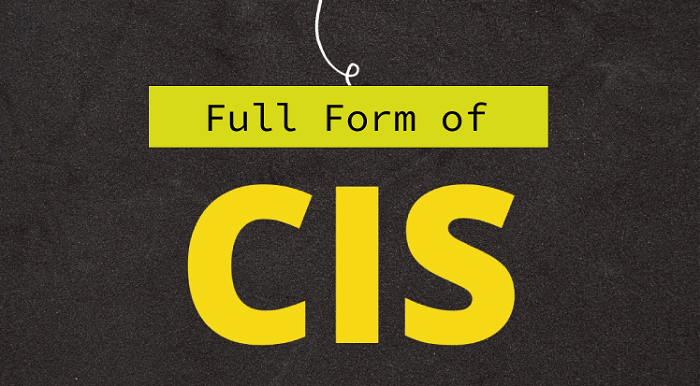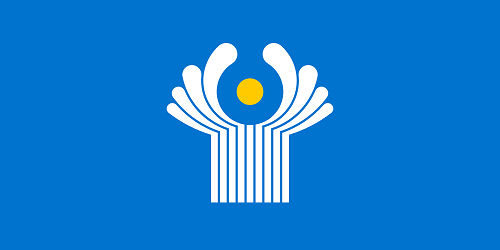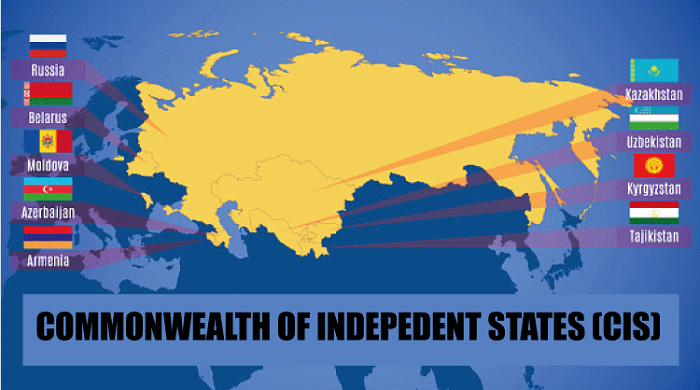What is the full form of CISCIS: Commonwealth of Independent StatesCIS stands for Commonwealth of Independent States (C.I.S.) is a free relationship of independent states established in 1991 by Russia and 11 previous Soviet Republics. The Ward of Free States was shaped on December 8, 1991, when the heads of Russia, Ukraine, and Belarus (Belorussia) consented to a settlement laying out another relationship to supplant the imploding Relationship of Soviet Communist Republics (U.S.S.R.). The Central Asian republics of Kazakhstan, Kyrgyzstan, Tajikistan, Turkmenistan, and Uzbekistan, as well as the Transcaucasian republics of Armenia, Azerbaijan, Georgia, and Moldova, joined the three Slavic republics in this style. (The ex-Soviet nations of Lithuania, Latvia, and Estonia wouldn't join the new Association.) The C.I.S. was laid out on December 21, 1991, and started activities the next month, with the city of Minsk in Belarus assigned as its definitive focus. 
The competencies of the C.I.S. are to organize its people's approaches to their economies, foreign relations, security, migration plans, natural assurance, and police. Its highest legislative body is a meeting of the heads of state (i.e., presidents) and government (state leaders), who are assisted by boards of republic bureau pastors in critical areas like finance and security. Individuals in the C.I.S. vowed to maintain their military and the old Soviet nuclear weapons stationed in their areas under a single binding order. However, this didn't prove easy in practice, as did individuals' efforts to coordinate the presentation of market-type components and confidential proprietorship into their specific economies. Following increased tensions between Russia and Georgia over the tiny region of South Ossetia, Georgia announced plans to exit the C.I.S. in August 2008. In August 2009, the withdrawal was completed. Following Russia's illegal annexation of the Ukrainian autonomous republic of Crimea in 2014, a middle-of-the-road conflict erupted in eastern Ukraine. By 2018, around 10,000 people had been murdered in clashes in the Donets Basin between the Ukrainian military and Russian-moved paramilitary organizations. HistoryThe C.I.S. began as a single Russophone social, social, and monetary sphere with the Russian Realm, which was replaced in 1917 by the Russian Republic following the February Uprising. Following the October Fomentation, the Russian Soviet Federative Socialist Republic turned into the essential republic in the Soviet Association (U.S.S.R.) with the 1922 Strategy and Declaration of the U.S.S.R. Game plan, trailed by the Byelorussian S.S.R., Ukrainian S.S.R., and Transcaucasian S.F.S.R. Mikhail Gorbachev, the head of the Soviet Association, suggested an organization in Walk 1991, in the middle of Perestroika and mounting political crises in the nation, by having a mission to defend the Association as an association of sovereign republics. The new settlement marking never happened because Socialist Faction hardliners staged a failed uprising in Moscow in August of that year. 
Following the event of a bombing overthrow, several U.S.S.R. republics declared their independence, fearing another uprising. The Ward of Free States was spread out on December 8, 1991, by the Byelorussian S.S.R., the Russian S.F.S.R., and the Ukrainian S.S.R. when the three republics' most elevated marks met at the Belovezhskaya Pushcha Conventional Hold, approximately 50 kilometers (31 miles) north of Brest in Belarus, and connoted the "Figuring out Spreading Out the Union. The C.I.S. pledged that the new organization would be open to all countries of the previous Soviet Union and other nations with comparable goals. The C.I.S. contract stated that each person was a sovereign and independent country, and the Soviet Association was successfully terminated. On December 21, 1991, the heads of eight added former Soviet republics (Armenia, Azerbaijan, Kazakhstan, Kyrgyzstan, Moldova, Turkmenistan, Tajikistan, and Uzbekistan) signed the Alma-Ata Declaration, which can be interpreted as extending the C.I.S. to these states or as the C.I.S.'s substantial foundation or foundation date, bringing the total number of participating countries to 11. Georgia became a component two years later, in December 1993. Currently, 12 of the 15 former Soviet countries are C.I.S. members. The three Baltic nations did not, reflecting their legislatures' and citizens' belief that Soviet dominance of their Realm after 1940 was ill-conceived. The C.I.S. and the Soviet Association coexisted until December 26, 1991, when the Soviet Republics officially disbanded the Soviet Association. This was followed by Ivan Korotchenya becoming C.I.S. Leader Secretary at about the same time. C.I.S. CharterOn January 22, 1993, the sanctions (Resolutions) of the C.I.S. were marked, establishing the numerous foundations of the C.I.S., their capacities, and the C.I.S.'s principles and standards. The Agreement further stated that all nations ratified the Settlement on the Underpinning of the C.I.S. and its applicable (Alma-Ata) Show would be considered C.I.S. founding states, while those major countries confirmed the Authorization would be considered C.I.S. member states. Different states might participate as partners or observers when approved by the C.I.S. Heads of State Meeting. All the founding states sanctioned the C.I.S. Contract and joined it except for Ukraine and Turkmenistan. In any event, Ukraine and Turkmenistan continued to participate in the C.I.S. despite not being member nations. Ukraine turned into an individual from the C.I.S. Money-related Relationship in April 1994, and Turkmenistan joined the C.I.S. in August 2005. Georgia departed the C.I.S. in general in 2009, and Ukraine exited in 2018. During a discourse at Moscow State School in 1994, Kazakhstan's Leader, Nursultan Nazarbayev, proposed making a "normal watchman" zone inside the C.I.S. Nazarbayev's idea was instantly recognized as a means of increasing trade, promoting regional interests, and acting as a stabilizer for West and East Asia. Between 2003 and 2005, three C.I.S. member countries saw changes in their hierarchies due to various unrests: Eduard Shevardnadze was overthrown in Georgia, Viktor Yushchenko was elected in Ukraine, and Askar Akayev was toppled in Kyrgyzstan. Georgia departed the C.I.S. in February 2006, declaring that "Georgia has adopted a road to join NATO and it can't be huge for two military strategies concurrently," yet it remained a full individual from the C.I.S. until August 2009, one year after officially withdrawing owing to the Russo-Georgian Conflict. In March 2007, Igor Ivanov, secretary of the Russian Security Chamber, conveyed his concerns about the C.I.S.'s convenience, emphasizing that the Eurasian Monetary People group was developing into a more capable organization to bring together the C.I.S.'s largest members. Following Georgia's resignation, the leaders of Uzbekistan, Tajikistan, and Turkmenistan skipped the C.I.S. meeting in October 2009, citing differences with the Russian League. The Gathering of Unfamiliar Priests met in Dushanbe, Tajikistan, on April 11, 2003, to examine the conflict in Iraq and consider a draught programmed for the battle against psychological oppression and fanaticism, including the specific requirement for a global job in post-war Iraq, to be additionally addressed at the May culmination in St. Petersburg. Developments2009In November, three key persons from the C.I.S., Russia, Kazakhstan, and Belarus agreed to form a traditions association that will open the doors to a single economic zone. Ukraine, unlike the other three countries, has avoided joining the traditions association because it wanted to encourage their approach "as per W.T.O. rules," as declared by Viktor Yanukovych on April 27, 2010. The Traditions Association will surely go into force on January 1, 2012. 2007On May 25, the C.I.S. Chamber of Heads of State convened in Yalta, Crimea, to discuss energy challenges. Armenia, Belarus, Kazakhstan, Kyrgyzstan, Russia, and Tajikistan agreed to form a common energy market, projected to increase power interchange and access to energy assets in C.I.S. republics. On May 29, the C.I.S. Electric Power Board convened in Yerevan to discuss the possibility of a normal energy market. The C.I.S. Protection Pastors Committee met on June 20 to discuss military engagement. Russian Safeguard Clergyman Anatoly Serdyukov stated that the Gathering had created a specific military coordination strategy until 2010. The meeting also examined financial concerns about the C.I.S. Joint Air Safeguard Framework. An agreement for combined Comradeship-in-Arms events to be held in four parts between June and September was also endorsed. Sergei Lebedev succeeded Vladimir Rushailo as the new C.I.S. leader secretary on October 5. 2006Ukraine and Georgia began negotiations in May to explore the possibility of leaving the C.I.S. Delegates from the two countries stated that they would examine whether the benefits of C.I.S. membership outweighed the costs. While Ukraine later pledged to remain in the alliance, Georgia said a gradual withdrawal was being considered. The C.I.S. Heads of Legislature met in Dushanbe, Tajikistan, on May 25. The meeting focused on making the organization more productive. Altogether, 22 chronicles were assessed, and 15 were endorsed without conversation. Among the endorsed archives was an agreement to create a worldwide asset on charitable partnership. On November 24, the C.I.S. Heads of Government gathered in Minsk to discuss cooperation problems among C.I.S. citizens, such as helpful policing and a joint air safeguard system. 2005At the meeting of Heads of Legislatures in Tbilisi on June 3, 2005, no target relevant to restriction or Weapon of mass destruction was adopted. The same is true for the Gathering of Pastors of International Concerns, which took place in Moscow on August 23, 2005. On August 26, 2005, the C.I.S. Heads of State met and set a few goals, including one for military involvement and another for combating unlawful intimidation. In the end, the groups agreed to increase their involvement in the fight against psychological oppression and to carry out the tasks of the ongoing program. The other purpose, the heads of state opted to strengthen the origination and execution of military collaboration till 2010 2004At a meeting of the Chamber of Unfamiliar Clergymen in Minsk in the spring, Belarusian President Aleksandr Lukashenka identified psychological warfare as the C.I.S.'s primary priority. The C.I.S. Heads of Government met on April 16 in Cholpon-Ata, Kyrgyzstan, to resolve a few issues, including anti-psychological warfare endeavors, transportation issues, and the possibility of establishing a solitary department to help States' efforts against coordinated wrongdoing, drug dealing, and illegal intimidation. Pioneers also agreed to establish a holding store to provide monetary and material assistance to states dealing with or recovering from natural or contemporary disasters. On April 17, it was also announced that the C.I.S. Between Parliamentary Gathering would send a party of observers to Kosovo to gather information on the situation and convey their findings to the Committee of Europe's regular meeting. 
The Chamber of Safeguard Pastors met in Armenia on May 21. They dealt with various issues, including the problem with intentions to establish a framework for regulating compact adversary of aero plane rocket structures. They also emphasized their desire to reach a multilateral agreement on their atomic limits problems. In June, the Chamber of C.I.S. Inside Pastors convened in Chisinau, Moldova, with representatives from the Leader Board of Trustees, the Antiterrorism Place, and the Coordinated Wrongdoing Department to review the implementation of psychological warfare strategies. This followed Russian intelligence agencies' launch of anti-psychological oppressor tasks in the C.I.S. region. 2003On April 11, the Committee of Unfamiliar Clergymen convened in Dushanbe, Tajikistan, to evaluate the crisis in Iraq and develop a draught program for combating global psychological tyranny and extremism. The Iraqi situation, particularly the need for a worldwide job in post-war Iraq, was also addressed at a May summit of the C.I.S. heads in St. Petersburg. Similarly, that month, a conference was conducted at the C.I.S. base camp in Moscow to assess the practicality of radar I.D. frameworks and to discuss other concerns related to military involvement. The Committee of Heads of State, Chamber of Heads of Government, and Gathering of Unfamiliar Priests met in Yalta from September 18 to 19 to discuss various financial, social, humane, and military matters. The Heads of Government agreed to an arrangement calling for C.I.S. part States' collaboration in the field of global shipments via freight following, a reminder on participation in global vehicle hallways, and a statement on the arrangement of safety on transport in part States under the Director Mr. N.T. Tanayex, Head of State of the Kyrgyz Republic. Furthermore, they opted to form a Committee of Legislative Organs Heads to oversee the protected market. The Committee of Unfamiliar Pastors met to discuss collaboration in the Realm of counter-wrongdoing and psychological warfare. The priesthood adopted a decision on steps to regulate particular compact air guard framework arrangements in the C.I.S. States, as well as a further aim of establishing a common coordination design to screen movement.
Next TopicFull Forms List
|
 For Videos Join Our Youtube Channel: Join Now
For Videos Join Our Youtube Channel: Join Now
Feedback
- Send your Feedback to [email protected]
Help Others, Please Share










